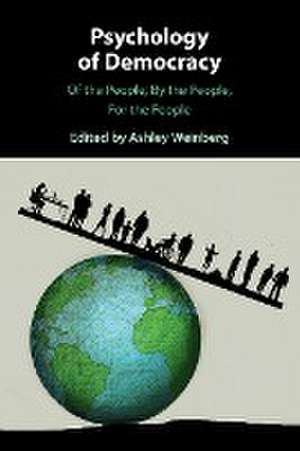Psychology of Democracy
Editat de Ashley Weinbergen Limba Engleză Paperback – 7 dec 2023
| Toate formatele și edițiile | Preț | Express |
|---|---|---|
| Paperback (1) | 260.64 lei 6-8 săpt. | |
| Cambridge University Press – 7 dec 2023 | 260.64 lei 6-8 săpt. | |
| Hardback (1) | 826.34 lei 6-8 săpt. | |
| Cambridge University Press – 2 mar 2022 | 826.34 lei 6-8 săpt. |
Preț: 260.64 lei
Nou
Puncte Express: 391
Preț estimativ în valută:
49.88€ • 53.33$ • 41.58£
49.88€ • 53.33$ • 41.58£
Carte tipărită la comandă
Livrare economică 18 aprilie-02 mai
Preluare comenzi: 021 569.72.76
Specificații
ISBN-13: 9781108745093
ISBN-10: 1108745091
Pagini: 470
Ilustrații: Worked examples or Exercises
Dimensiuni: 152 x 229 x 26 mm
Greutate: 0.62 kg
Editura: Cambridge University Press
ISBN-10: 1108745091
Pagini: 470
Ilustrații: Worked examples or Exercises
Dimensiuni: 152 x 229 x 26 mm
Greutate: 0.62 kg
Editura: Cambridge University Press
Cuprins
1. Psychology of democracy Ashley Weinberg; of the people; 2. Personality, politics and strong democracy: a review of research and future directions Jo Silvester and Madeleine Wyatt; 3. From Big Ben to the breakfast table: basic values and political attitudes among politicians and the public James Weinberg; 4. Under the microscope: Prime Minister's questions in the UK Parliament Peter Bull and Maurice Waddle; 5. Cognitive complexity: sometimes a boon and sometimes a danger to democracy Peter Suedfeld; 6. In 'a league of their own'? Judgement and decision-making by politicians and non-politicians Barbara Vis and Sjoerd Stolwijk; 7. The mental well-being of politicians Ashley Weinberg; by the people; 8. Trust in political institutions and support for authoritarianism in Latin American students: does civic knowledge make a difference? Daniel Miranda, Juan-Carlos Castillo, Catalina Miranda and José Conejeros; 9. New technology, language and gesture in contemporary Indian political discourse Rukmini Bhaya Nair; 10. Fact or fiction: influences on voter decision-making in a disinformation environment David Redlawsk, Kyle Mattes and Karol Solis Menco; 11. Dissecting the psychology of a voter: a citizen-centric approach in studying electoral experience and behavior Sarah Harrison; 12. Building trust through a revolving door of leaders: the poisoned chalice Joakim Eidenfalk and Stuart Woodcock; 13. After the party is over Jane Roberts; for the people: 14. Democracy as a moral challenge Gian Vittorio Caprara; 15. 'Can I trust my future?' Youth civic engagement, civic identity and dystopias Ben Bowman, Thalia Magioglou and Helen Haste; 16. Religious identity politics and genuine support for democracy Gizem Arikan and Pazit Ben-Nun Bloom; 17. Psychology, democracy and the media: are citizens learning from the news? A self reflective learning perspective Sharon Coen and Karl Turgut Maloney Yorganci; 18. A social psychological approach to understanding China's democratisation Yida Zhai; 19. The psychology of radicalised conceptions of democracy – steps too far? Rod Dubrow-Marshall.
Recenzii
'There are hundreds of books on democratic decline and political disaffection, but none of them exposes the emotional dynamics and drivers of fear and frustration, anger and apathy with the precision provided by Weinberg's Psychology of Democracy. It is destined to become a major reference point for anyone interested in the past, present or future of democracy.' Matthew Flinders, Founding Director of the Sir Bernard Crick Centre and Professor of Politics at the University of Sheffield, and Vice President of the Political Studies Association, UK
'This is a unique book, by top scholars from across the globe, exploring the fragile nature of democracies from a psychological perspective. It is a must-read for those who want to understand what is happening to democracies from a human behaviour point of view in this profoundly difficult period of history.' Sir Cary Cooper, Professor of Organisational Psychology, University of Manchester, UK
'Essential reading for students, researchers and laypersons interested to learn and explore how psychological science can contribute in important ways towards strengthening democracy.' Fathali M. Moghaddam, Professor of Psychology, Georgetown University, USA, and author of Shakespeare and the Experimental Psychologist
'This book forcefully illustrates psychology's critical contribution to our understanding of democracy as a form of government 'of the people, by the people and for the people'. Its international team of contributors spans a wide range of topics crucial for revitalizing democracy today.' Brady Wagoner, Centre for Cultural Psychology, Department of Communication and Psychology, Aalborg University, Denmark
'This is a unique book, by top scholars from across the globe, exploring the fragile nature of democracies from a psychological perspective. It is a must-read for those who want to understand what is happening to democracies from a human behaviour point of view in this profoundly difficult period of history.' Sir Cary Cooper, Professor of Organisational Psychology, University of Manchester, UK
'Essential reading for students, researchers and laypersons interested to learn and explore how psychological science can contribute in important ways towards strengthening democracy.' Fathali M. Moghaddam, Professor of Psychology, Georgetown University, USA, and author of Shakespeare and the Experimental Psychologist
'This book forcefully illustrates psychology's critical contribution to our understanding of democracy as a form of government 'of the people, by the people and for the people'. Its international team of contributors spans a wide range of topics crucial for revitalizing democracy today.' Brady Wagoner, Centre for Cultural Psychology, Department of Communication and Psychology, Aalborg University, Denmark
